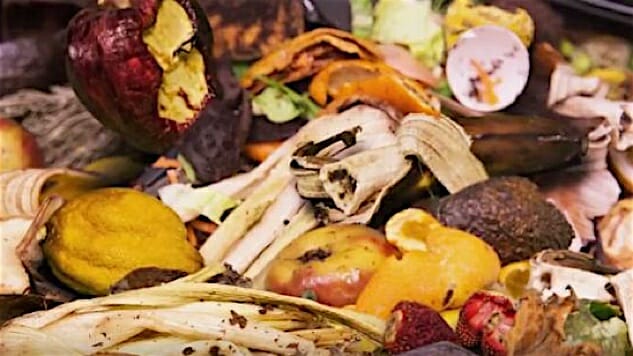Wasted!: The Story of Food Waste

Anthony Bourdain would like to make sure you understand that he is cringing inside at the thought of championing a cause dear to “neckbeard man-buns” and other hipster assholes with an ecological axe to grind. The very thought is causing tattoo-distorting hives and a level of butt-hurt he hasn’t experienced since he ate tainted Tete de veau to the ratings-escalating joy of schaden-foodies around the world.
So just be clear: “Food waste” is not a pet cause of his because it’s a glaring, insane, totally fixable global problem that’s rapidly accelerating environmental destabilization, public health problems galore, food insecurity, poverty and hunger, and quality of life on this planet in general. (That’s Tristram Stuart’s thing and more power to him.) Tony? He’s a fuck-you-Jack aesthete like he’s always been, okay? He takes TV network money to saunter around the globe getting shitfaced and having autoerotic experiences with sushi and pork belly and that’s the deal. He’s in this Wasted documentary project because as a trained chef, he was hardwired to abhor waste, to use everything, and fuck you, Jack, if you don’t get why, but he’s going to make this one world-weary attempt to help extract your man-bun from your ass for you so you can take a look around you at the unholy fucking mess you are making with your ignorance, got it, cutie?
Good.
This waste-abhorrent foodie aesthete (born in the shadow of the Marin County granola mines and raised in spittin’ distance of the Deathstar known as Chez Panisse) does not care what has or has not motivated Mr. Bourdain, officially or unofficially. Sir, your curmudgeon creds will not be questioned here. Crank on, Cranky! The point is, unless you are Tristram Stuart or one of a small handful of really tuned in folks out there, you need to watch this documentary. It might depress you. It might scare you. But I doubt it.
Fun Fact: 90% of U.S. food waste ends up in landfills, where it creates large amounts of methane, a greenhouse gas that makes CO2 look like a piker.
Fun fact: None of that food waste has to end up in landfills at all. There are alternatives available to literally everyone, most of them requiring little to no effort. We are just too lazy and ignorant to extract our man-buns from our posteriors and be aware of it.
-

-

-

-

-

-

-

-

-

-

-

-

-

-

-

-

-

-

-

-

-

-

-

-

-

-

-

-

-

-

-

-

-

-

-

-

-

-

-

-








































